/cdn.vox-cdn.com/uploads/chorus_image/image/66655449/GalleryChar_1900x900_phantomstranger_52ab8669af6581.48771058.0.jpg)
 A Sense of Doubt blog post #1888 - No superhero hates God more than the Phantom Stranger and more Stranger content
A Sense of Doubt blog post #1888 - No superhero hates God more than the Phantom Stranger and more Stranger contentHi again, welcome to Comics Sunday.
A new edition to why we stay home and read comics. I even made a category for Sunday Comics as Sunday will be comic book day for the forseeable future on this blog and in the lives of many like-minded comic book geeks such as myself.
I have been hard at work at two other comic posts but neither are ready for publication yet. I am embarked on a re-read of arguably my favorite comic book of all time, Planetary by Warren Ellis and John Cassady, but I am not yet ready to unveil the re-read of the first issue. ALSO, I have been working on a huge love letter to the PHANTOM STRANGER with a fairly comprehensive cover gallery and detailed synopses for, at least, the 1970s comics. However, it's proving more time consuming that I realized, plus there's tons of spill over content. And so I decided to share a great deal of the spill over here in a prelude to the longer post (and this post is plenty long).
It's Sunday.
Stay in and read comics.
I am doing that reading but I have to put more work to bed first.
One quick thought on the Phantom Stranger.
The thing that I like best about the character is that there's no definitive origin story. Even the Judas-origin created by Dematteis for DC New 52 has now been retconned as "alternate" universe content.
And so, we have no origin for the Phantom Stranger because the "answer" to the riddle of who and what he is will never be as satisfying as the mystery. It's better to have the mystery. The mystery is the most intriguing thing about him.

Here's links I wanted to share but did not want to re-share all the content therein:
https://www.cbr.com/dc-comics-trivia-phantom-stranger/
https://comicbookreadingorders.com/dc/characters/phantom-stranger-reading-order/


Somehow #Zatanna is trending and I've yet to see a tweet write something backward, hms pic.twitter.com/1BlEpHstQl— Parker: SOCIAL D (@jeffparker) April 16, 2020

![Stay-at-Home Reading [Comic]](https://i2.wp.com/www.geeksaresexy.net/wp-content/uploads/2020/04/stay.jpg?resize=600%2C659&ssl=1) |
| https://www.geeksaresexy.net/2020/04/13/stay-at-home-reading-comic/ |
GEEKS ARE SEXY - cool site!!
About
 [Geeks are Sexy], which was originally a personal project of a sysadmin, was launched in October 2005 on a free Blogspot account. A little more than a year later, the site became too big to be effectively managed and exploited on the blogger platform. The [GAS] team then decided that it would be better to move everything to a more serious blogging solution (WordPress) on a paid hosting service.
[Geeks are Sexy], which was originally a personal project of a sysadmin, was launched in October 2005 on a free Blogspot account. A little more than a year later, the site became too big to be effectively managed and exploited on the blogger platform. The [GAS] team then decided that it would be better to move everything to a more serious blogging solution (WordPress) on a paid hosting service.
The mission of [GAS] is simple: Providing up to the minute tech. news, reviews and tutorials to our readership, which is mainly composed of IT professionals and computer enthusiasts
https://www.polygon.com/comics/2020/4/15/21219807/dc-comics-jesus-god-phantom-stranger
No superhero hates God more than the Phantom Stranger
A look at the origins of DC Comics most mysterious ‘superhero’
mainstream superhero comics go out of their way to avoid mentioning the Judeo-Christian religion, since it makes the existence of Norse thunder gods and Amazonian myths feel a bit awkward. The major exception to the rule is DC Comics’ Phantom Stranger.
Even though he’s served as an enigmatic advisor/guest star for a host of heroes, many of them still distrust the immortal, immensely powerful, and practically omniscient being because they don’t know who he is or where he came from. They also don’t know how mad he is at God.
Back in 1987, Secret Origins #10 revealed not one, but four potential origin stories for the Phantom Stranger, and almost all of them were atypically religious in nature. But even more unexpectedly, they also featured the Stranger’s personal grudge against God and Jesus.
Polygon has already spent some time on how long it took the comics industry just to be able to mention god. Here are four strange backstories where maybe god was mentioned too much.
THE UNDECIDED ANGEL
:no_upscale()/cdn.vox-cdn.com/uploads/chorus_asset/file/19898548/IMG_01CC230BB3CB_1.jpeg)
Written by the Alan Moore and drawn by Joe Orlando, “Footsteps” imagines the being who would become the Phantom Stranger as an extremely handsome, white-haired angel who’s having trouble picking sides in the upcoming God-Satan war. On the one hand, the idea of openly warring against Yahweh (as He’s named) seems like a bad idea, but on the other, the angel is vastly upset by Yahweh’s plan to populate the Earth with “homunculi,” i.e. humans. So he accepts an invitation from the angel Etrigan — presumably that Etrigan — to hear Satan’s pitch. Satan, who is still considered an angel at this point despite being the only heavenly being to rock cloven hooves, fails to convince the Stranger, who sits out the battle.
When the rebellion starts getting its collective divine asses kicked down to Earth, Etrigan implores him for help again. The future Stranger continues to hem and haw until Etrigan slips and knocks them both to Earth. Now damned by default, the Stranger flies over to Satan’s fallen angels for shelter, who have all been malformed by Yahweh in addition to being cast out of heaven. Understandably somewhat bitter, they rip the Stranger’s wings off and tell him to get lost… for eternity.
This is actually only half the story, as it alternates with a story set in modern-day New York, a place so full of filth and packed with degenerates it might as well have been copied-and-pasted from Watchmen; at one point, the modern-day Stranger stands in the sewers, which are filled with monstrous-looking derelicts and muses, “I stand listening, here where all the abortions come, all the torn-up love letter and baby alligators and used people.” You can imagine that he’s just waiting to whisper “No.”
In what may be Moore’s least subtle, nuanced metaphor ever, a man considers joining the “Subway Angels” or the “Sewer Survivalists” and is rejected and assaulted by both. Luckily, the Phantom Stranger is there to give him a helping hand up … although the hero was also there, watching, when the guy was getting beat up, so his hand could have been considerably more helpful.
In this origin, God is definitely angrier with the Phantom Stranger than vice versa, although there’s something pointedly self-righteous in the way the Stranger helps someone who’s fallen get back up, an act of kindness he was not afforded.
BLESSED BUT BITTER
The Phantom Stranger is significantly angrier at God in “…and men shall call him Stranger” by Paul Levitz and Jose Luis Garcia Lopez. This time, he’s the only good man in an ancient city that is either Sodom, Gomorrah, or an incredibly close facsimile. Its inhabitants are all about gluttony, fornication, and not praying, right up until God gets His vengeance on the city, which is blasted by lightning, set on fire, struck by an earthquake, and then hit with a flood which washes away anyone left standing.
All this time, the only Good Man in the Bad City prays for the Lord to forgive and spare his people, including his wife and children. Instead, an angel arrives to take him away to safety as the city’s sole survivor. The man is not at all cool with this, and asks what is in all honesty two questions most moralistic religions have grappled with for centuries: “Even if it takes until the end of time itself, is it not better for evil to be turned to good, and sin to virtue? If all is possible in Heaven, why must my city be damned?”
:no_upscale()/cdn.vox-cdn.com/uploads/chorus_asset/file/19898570/IMG_734A4D27BCB2_1.jpeg)
This irritates the angel, who pulls the “it’s not for man to understand God’s plan” card, which in turn irritates the man. He holds his sword to his stomach, telling the angel if his city dies, he’s dying with it. This irritates the angel even further, and the divine being becomes straight-up livid when he holds true to his word and angrily commits suicide.
“Yet you have rejected the gift of life and even the mercy of the creator of life itself. For that you should properly be damned,” the angel says, grabbing his soul as it begins to float off and shoving it back into his body.
Here’s the crazy part: By essentially throwing God’s get-out-of-damnation free card back in His divine face, the man gets his way. The city and its inhabitants, including the man’s family, are spared. The price, of course, is that the man must wander the Earth forever, with no recollection of who he is, where he’s from, or what he did. It’s a very strange punishment that seems very arbitrary, but again, it’s not for humanity to understand God’s plan. Even if we can annoy Him into changing it sometimes.
THE JESUS TORTURER
The very first “origin” in Secret Origins #10 is, in my opinion, the most outrageous of the four, and one of the most outrageous things I have ever read in a comic. A few years after 0 C.E., a man named Isaac, his wife, and his very young son live a happy life in Bethlehem—that is, until King Herod unleashes the “Massacre of the Innocents.” It’s the grandiloquent name for the Judean ruler’s decree, after the Wise Men informed him the King of the Jews had been born, that all boys two and under in the Bethlehem tri-state area must be killed. This naturally includes Isaac’s son, but the king’s soldiers also kill his wife when she causes a scuffle. A few decades later, Isaac happens to see the guy whose existence (indirectly) destroyed his family, which is to say, Jesus.
Isaac hates Jesus so much, you guys. He despises the Son of God to a truly shocking degree, especially for a mainstream superhero comic published in 1987.
:no_upscale()/cdn.vox-cdn.com/uploads/chorus_asset/file/19898581/IMG_3F2BF8AC2CF5_1.jpeg)
After the Lamb of God is arrested and sentenced to be crucified, Isaac bribes a soldier and takes his job for the day, because that job is torturing Jesus. Of the comic panels that have been permanently etched into my brain, the one where a future DC superhero whips Jesus with a barbed cat-o’-nine tails is first and foremost. When Isaac adds a bit of mockery to the torture session, a somber Jesus condemns the man to walk the Earth until the Second Coming.
Written by Mike Barr with art by Jim Aparo, “Tarry Till I Come Again” turns the Phantom Stranger into the myth of “The Wandering Jew,” a 13th century legend about a man who received the same curse after insulting and/or injuring Jesus on his way to his crucifixion. There are many different versions of said myth, but as far as I know, this comic is the only story where God tells the Wandering Jew he’s been forgiven and can finally die via text messages sent into a fireplace. However, the now-penitent Phantom Stranger asks if he can continue wandering around the DCU and helping people a while longer, which God OKs. So at least they end up on speaking terms.
:no_upscale()/cdn.vox-cdn.com/uploads/chorus_asset/file/19898516/IMG_C1DF6F61ABD1_1.jpeg)
THE GREAT BETRAYER
After DC cleared off its metaphorical table and served up the New 52, former co-publisher Dan Didio brought out a new Phantom Stranger series in 2012, giving the hero a very specific and canonical origin — one that was just as religious as his previous versions had been. This Stranger was none other than Judas Iscariot, the Apostle who effectively sent Jesus to the Crucifixion for 30 pieces of silver, making him the most iconic betrayer in Western culture, and his name synonymous with “traitor.”
Unlike the biblical character, a tribunal of seven wizards sentenced the comics character (along with Pandora and a guy who would become the Question) to wander the Earth for eternity as the Trinity of Sin, part of one of the New 52’s never-quite-picked-up plot threads. The 30 silver coins were transformed into a stylish necklace Judas could never take off until he performed 30 tasks, some of them even more tortuous betrayals, each commanded by “the Presence” (DC’s equivalent/codeword for the Judeo- Christian deity).
Whether he’s a fallen angel, a pious man, the Wandering Jew, or His divine employee, the Phantom Stranger and God have always had a rocky relationship. But it’s never too late to be forgiven. Maybe next reboot.
Rob Bricken has been a professional nerd for 20 years, the editor of Gizmodo’s geeky pop culture site io9, and was the creator of the fan-favorite, unfortunately named news blog Topless Robot. He lives in West Virginia, where he spends time writing and regretting action figure purchases.


https://www.criminalelement.com/follow-me-into-weird-worlds-dcs-the-phantom-stranger/
Follow Me into Weird Worlds: DC’s The Phantom Stranger
Ask me my favorite superhero—that's easy. The one character whose comics I want to be buried with; the guy I would dress as at Comicon, were I to be so lame; the hero whose powers I would most want to have: the Phantom Stranger. No question.
Part of the appeal is that the Phantom Stranger isn't 100% a superhero. He's not fully anything. He's a member of the Justice League, who only barely qualifies as a costumed crime fighter—he's as much a part of the wave of horror and supernatural comics that DC published in the late sixties and early seventies. He has mystical powers, yet he wears a fedora and a turtleneck. And in his comic series, he's as much a narrator as a player.
If he ever needed a new alias, the Stranger could go with the Preluder, or Exposition Man. Like Rod Serling, he often sets the stage for eerie tales in which ancient curses teach people hard lessons. Then, he appears in the very stories he introduced, warning the characters that the time for changing their evil ways is growing short.
It's never really clear what the Stranger's powers are exactly, and official word from DC isn't that his origin is unknown, but that he has several origins, all conflicting and all, more or less, canonical.
Two involve angels, one involves Christ, and one has the Stranger as a time traveler being reconstructed in the energies of the Big Bang. He is a one-man multiverse, in a comic book cosmos that already has several multiverses: presumably, the sum totality of each universe's iteration of the Phantom Stranger is equal to the scale of the DC multiverse itself.
Another odd thing about the Phantom Stranger is that his series never seem to work. Early on, back when he wore a trench coat and necktie, he was a shadowy dude, who seemed to have his finger on the pulse of some heavy mystical shit. He shared his adventures with Dr. Terrence Thirteen, aka the Ghost-Breaker (who ya gonna call?)—a comic book version of the Amazing Randi, absolutely certain that the Stranger was a charlatan and a conman in need of merciless unmasking. This humorless dance between the otherworldly Stranger and a guy who was never going to buy his shit seemed to grow tiresome, even for the readers (the Stranger was pretty fed up by their first meeting), and Dr. Thirteen dropped out of the series early on, reappearing in occasional backup stories where, at last, he exposed supernatural scams as all too natural.
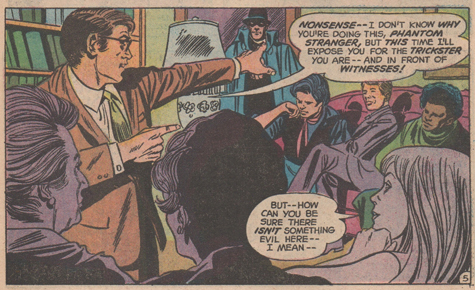
By the time the Phantom Stranger/Dr. Thirteen contretemps were getting stale, the writers had added a group of paranormal investigator teens, who must have been inspired by Scooby Doo. An arch villain had also reared her lovely head, Tala—a kind of evil spirit, whose look presaged Elvira, Mistress of the Dark. She, too, went away, traded in for someone a little more solid—a mortality-obsessed modern mage called Tannarak, who, in the spirit of supervillainy, at one point, started wearing a perplexing green outfit with tights and a matching cape.
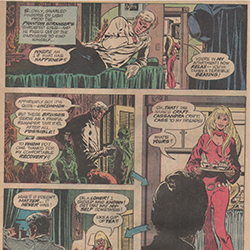 Continuing to throw spaghetti at the wall only to watch it slide to the floor, the writers gave our hero a girlfriend, the blind mystic Cassandra Craft, whose wardrobe seemed to consist of a single magenta pantsuit and a medallion belt.
Continuing to throw spaghetti at the wall only to watch it slide to the floor, the writers gave our hero a girlfriend, the blind mystic Cassandra Craft, whose wardrobe seemed to consist of a single magenta pantsuit and a medallion belt.
Heaping specifics onto a character so completely removed from our familiar world was never a good idea. The stories improved when they shifted from the battling-wizards tales to Twilight Zone-esque slices of the uncanny and glimpses into the other side.
A useless mini-series in the 80s and a reboot during DC's New 52 campaign, that started out promising but fizzled, only proved the futility of writing the Stranger as a protagonist. The stories that worked best were the ones where he was not the hero.
And here's where the Stranger's strengths lie. He's not an adventurer, but a story element. In the awful mini-series Legends (the comic which, by the way, gave us the soon-to-be-immortalized-in-film Suicide Squad), the Phantom Stranger took the pro-hero side of a cosmic debate between himself and the evil demigod Darkseid—a debate that played out among the living on earth. And, on an episode of the cartoon Batman: The Brave and the Bold, the Stranger is the side of forgiveness and reconciliation in a similar debate with the Spectre (speaking for harsh, uncaring retribution) about the routes Batman could take to redress his parents' killings.
The Stranger's vagueness has served him well; he keeps coming back and proving what he's made of, without ever verifying exactly what that is. Unlike other characters whose histories get tossed aside with each reboot, the Stranger's breaks with continuity, every time a new series starts up, aren't jarring. He never belonged to a continuity. And, while he's never been the most satisfying four-color adventurer, he offers storytelling possibilities that other heroes, even those who jump between realities like Animal Man, the Swamp Thing, and the Flash, can't quite reach.
The Stranger would come to preside over a collection of DC’s oddest, eeriest heroes, and his comic would become the place to find other ultra-mysterious do-gooders. One of the most mysterious—someone who was even more of a cypher than the Phantom Stranger—would take up residency as a backup feature in later issues of the Stranger’s 70s series, and we shall turn our gaze on her next.
Hector DeJean can frequently be found in comic stores, bookshops, and the Eighties. His serialized story of a private detective who only solves food-related crimes is no longer online.

https://www.usatoday.com/story/life/2013/08/05/phantom-stranger-comic-book-series/2619205/
DeMatteis puts biblical bent on Phantom Stranger legacy
Brian Truitt
USA TODAY
In the world of DC Comics, the Phantom Stranger is responsible for one of the biggest betrayals in all of history. Yet J.M. DeMatteis has found a way to make readers feel for him as much as he does as a writer.
One of the Trinity of Sin along with Pandora and the Question, the character's known as the Phantom Stranger but back in the day he went by Judas Iscariot, and the series Trinity of Sin: The Phantom Stranger has retold the story of his treachery against Jesus Christ, and added the curse of having to walk the Earth for 2,000 years until he is forgiven plus obstacles and relationships along the way in his redemptive quest.
It all adds up to emotional moments worth much more than 30 pieces of silver.
"The Stranger — in both his inner and outer journeys — has been pushed to the psychological and emotional brink," says DeMatteis, one-half of the Stranger creative team with artist Fernando Blanco. "It's not fun for him — sometimes it's not fun for me — but it makes for strong stories."
A recent tale has had him venture from hell to heaven and back again to save the souls of a family that he made himself a part of — mainly by saving them from the patriarch of the clan, who now has become the villainous Sin Eater.
Available Wednesday digitally and in comics shops, issue 11 finds the Stranger tossed into the "Trinity War" crossover with the three Justice Leagues. The heroes watched Superman kill Doctor Light in cold blood, but feeling the Man of Steel is somehow innocent, Batman, Deadman and Katana convince the Stranger to lead them to the afterlife to find Light and the truth.
There's one caveat, though: During his last visit to heaven, the angel Zauriel told the Stranger, in no uncertain terms, that he can never return to the afterlife. If he does, he would be erased from all time and existence.
"So the question is, why is this man risking everything for Doctor Light, a man he doesn't even know?" DeMatteis says. "The answer will reveal just how far the Stranger has come, how much he's evolved, since he began this journey to redemption.
"This may be the single-most important Phantom Stranger story we've done so far," he adds. "The actions that he takes — and the repercussions of those actions — will have an impact on the book for months to come."
There has also been some drama involving those other members of the Trinity of Sin. Pandora's already confronted him, and the Question had one of the Stranger's only allies, Doctor Thirteen, stab him with the mythic Spear of Destiny, the weapon said to have pierced the side of Jesus during his crucifixion.
DeMatteis has been talking to Trinity of Sin: Pandora series writer Ray Fawkes about a crossover to explore that relationship, since DeMatteis feels she might hold "some surprising keys" to the Stranger's past.
What is definitely coming soon is a confrontation between him and the Question in issue 13, DeMatteis says. "Along with being a massive battle that takes them across the world to Jerusalem — considering the Stranger's past, it's a fitting setting — the story will also get deeper into the relationship between these two and shed some light on why Question loathes him so much."
Nobody hates the Stranger as much these days as Sin Eater, and he plays a role in a big story line coming up involving the mysterious entity called Non as well as guest stars Etrigan the Demon and the Spectre. (The seeds of the conflict are planted in Phantom Stranger issue 11, according to DeMatteis, and stuff will get very big and very cosmic.)
The Stranger will continue to evolve and find a role in the DC Universe, the writer says, as will Chris Esperanza, the boy he brought back from the afterlife in Stranger issue 10. "His relationship with the Stranger is the key to that evolution."
Clad in his trademark trenchcoat, fedora and necklace, the Phantom Stranger has been a fixture in DC's supernatural circles as a cult occult character since 1952.
When DC co-publisher Dan DiDio headed up the launch of the series last year, though, he started with the biblical origin but also created a brand-new character that was true to his roots.
"I especially love the human element he brought in, the wife and children — and yet the cloak-swirling awe and mystery that's always been an essential part of the Stranger is very much there," says DeMatteis, who joined the book as a co-writer with the sixth issue and took over full scripting duties with No. 9.
In his stint, he's focused on the Stranger's "interior world" plus the character's spiritual themes, which has always fascinated him in dealing with the DC Universe's more mystical denizens.
"By their very nature, they allow us to explore issues of sin and redemption, heaven and hell, the nature of God, the nature of reality itself," DeMatteis says.
But, he doesn't see Phantom Stranger as dealing exclusively with Christian theology — the character's jaunt to heaven in issue 10 embraced a broader view of several paths and traditions.
"In the end, all the metaphysical themes don't matter unless they're rooted in grand adventures, intriguing characters and powerful emotions," DeMatteis says. "That's the core of this book. Everything else builds on that."
He also sees a universality in the Stranger's tale of redemption. Each is different because everybody's different, yet the search for salvation is the one thing always in common.
"We've all screwed up, made mistakes that we'd like to take back, inflicted wounds we'd like to heal," DeMatteis says. "For most of us, it's the smaller things — for the Stranger, it's the massive burden of having betrayed the Lamb of God."
Upcoming issues will show, however, that the our concept of redemption may not be completely accurate.
"Maybe the sins the Stranger has committed aren't sins at all. Maybe they've been part of a larger plan," DeMatteis says. "For the past 2,000 years, the Phantom Stranger has worn the cloak of a villain, perhaps the most despised villain in all of history. Could that portrayal be completely wrong? I'm not saying that's how it will play out, but it's certainly an area we'll be exploring."
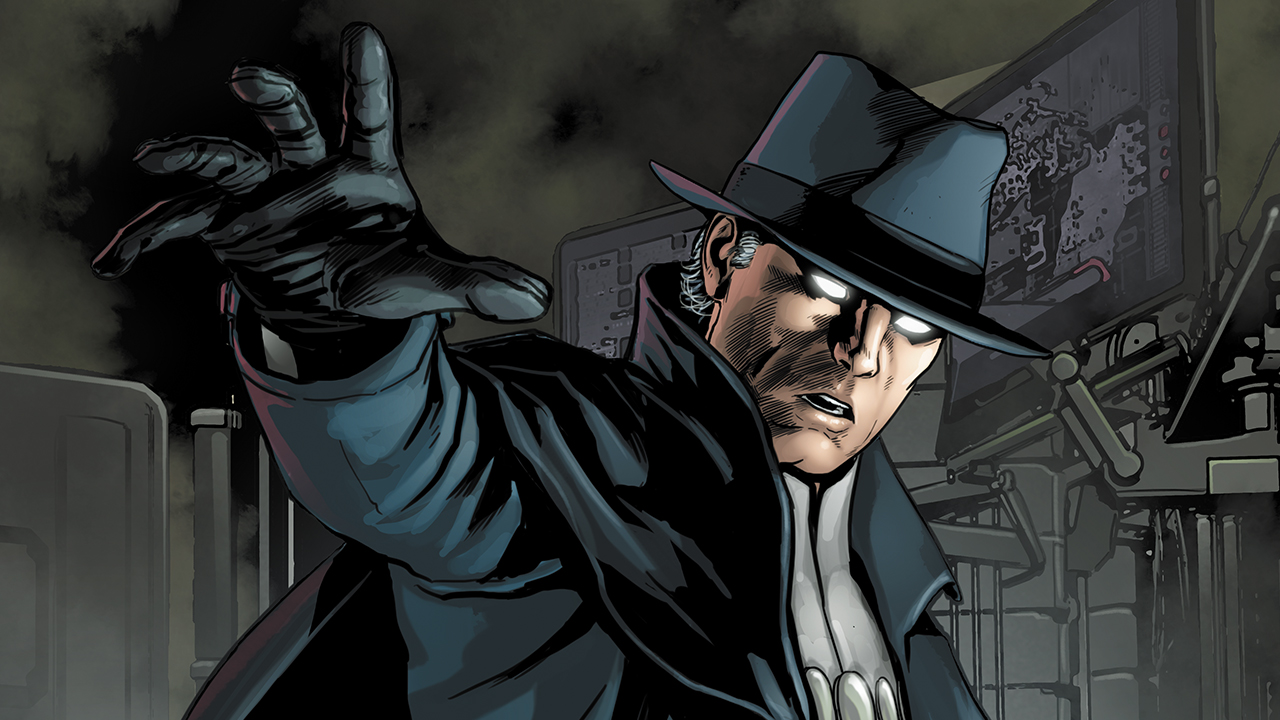
https://www.dcuniverse.com/news/5-reasons-we-love-phantom-stranger/
5 Reasons We Love the Phantom Stranger
Dressed in a dark cloak and hat, the Phantom Stranger is no ordinary DC Super Hero. This mystery man is one of the DC Universe’s most powerful characters, yet, true to his name, he remains a stranger. Despite his cryptic persona, we absolutely love the Phantom Stranger, and since he makes his live-action debut in the latest ‘Swamp Thing’ episode “Drive All Night,” a whole new audience is now discovering why he’s so special. Here are 5 reasons why we love the Phantom Stranger…
His Origins Are a Mystery
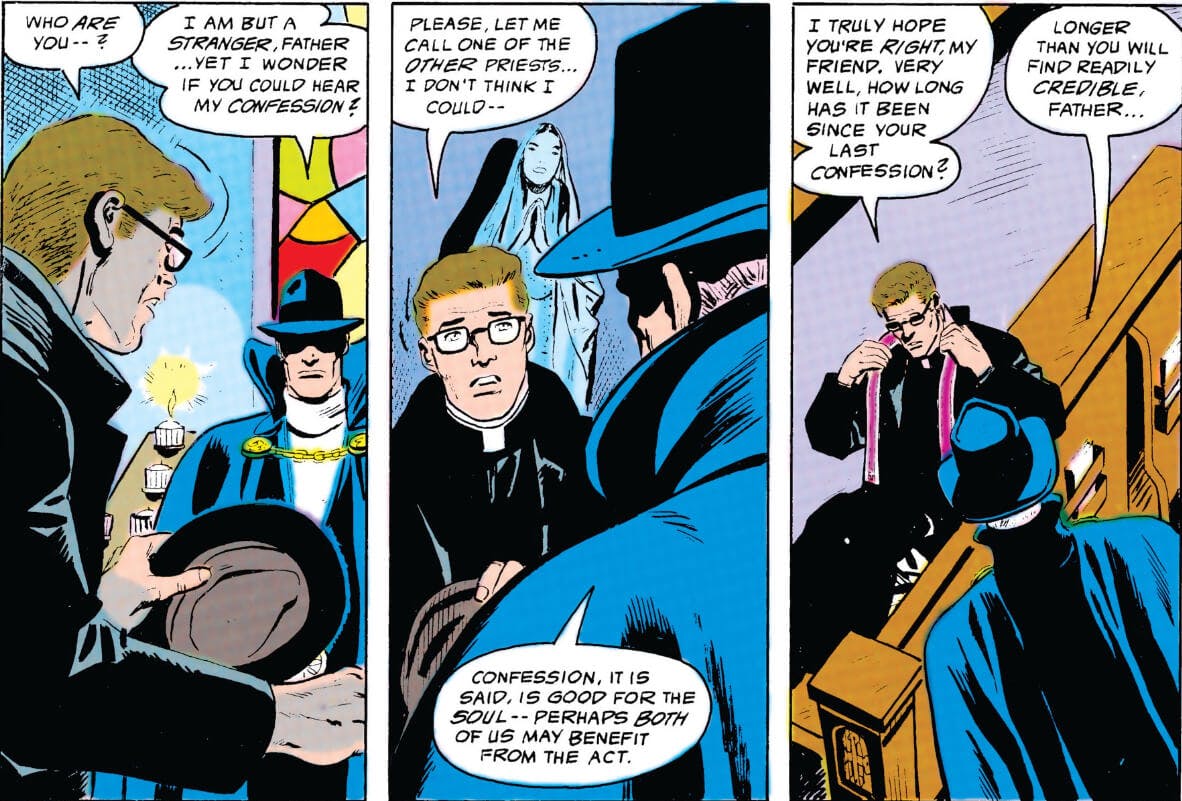
Although he’s been around for many years, the Phantom Stranger’s true origins remain a mystery. Nobody knows his real name or how he received his omniscient powers. ‘Secret Origins’ #10 presented four possible backstories for the Stranger, with no indication as to which one was real. One story presented him as a modern version of the Wandering Jew, while another tale stated he was an ancient man barred from the afterlife after committing suicide. 2012's ‘Phantom Stranger’ #0 (written by Dan Didio and penciled by Brent Anderson) depicted him as Judas Iscariot, doomed to walk the Earth to atone for his sins. With each origin story contradicting the others, we may never unravel the truth about the Phantom Stranger’s beginnings. But that might be for the best – after all, what else would you expect from somebody with the name Stranger?
He Knows All, He Sees All
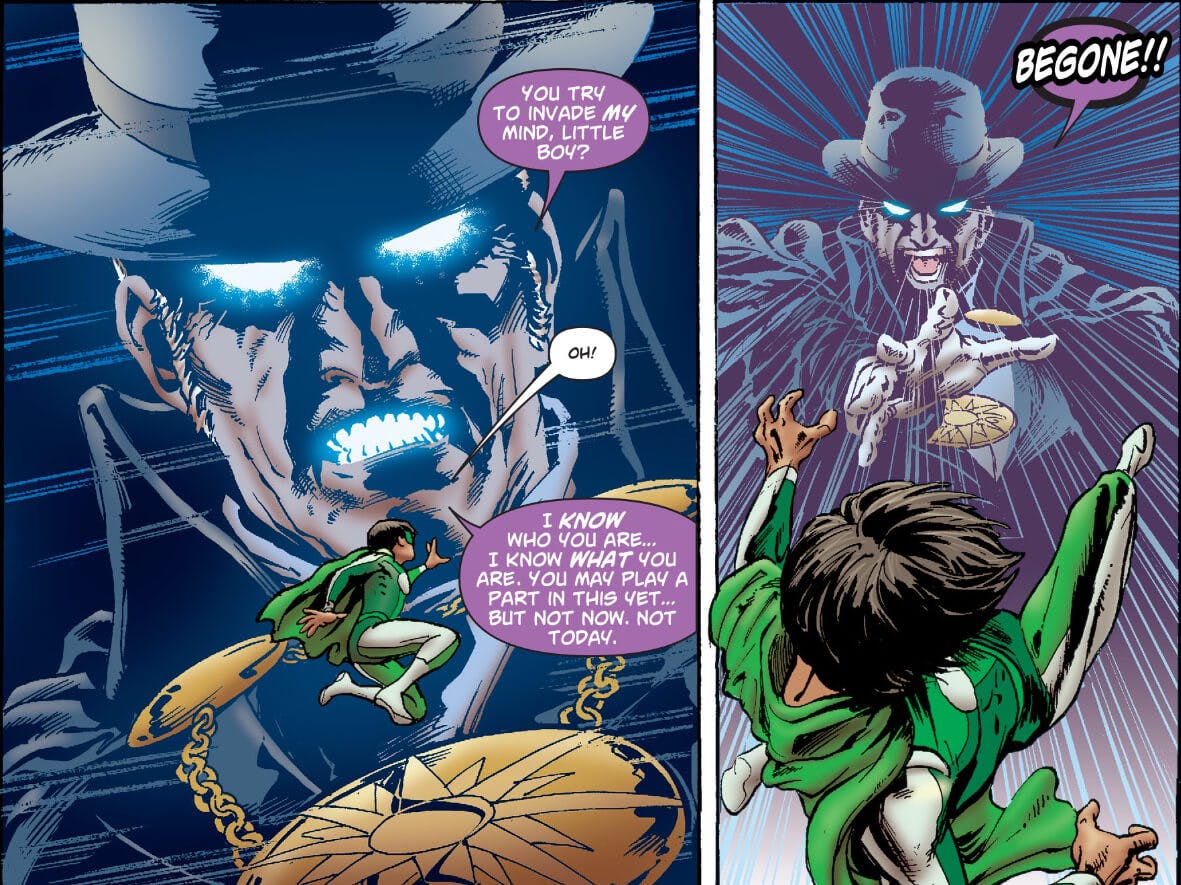
We weren’t kidding when we said that Phantom Stranger was one of the most powerful heroes in the DC Universe. We may not know where his great powers come from, but we know that they are nearly infinite. For starters, the Phantom Stranger has displayed uncanny omniscience. He seems to know everything past, present, and sometimes future! It may take the Dark Knight hours or days to solve some mysteries, but the Phantom Stranger can close a case in seconds. The Stranger is a master of magic, he can travel through dimensions, and he can manipulate reality to his whim. He’s also a master of hand-to-hand combat -- not that he needs it, because his energy blasts are powerful enough to take down most enemies. The full extent of the Stranger’s powers has yet to be revealed, as new abilities seem to pop up when readers least expect it. Suffice it to say, it’s a good thing he’s on our side!
He's Neither Alive nor Dead
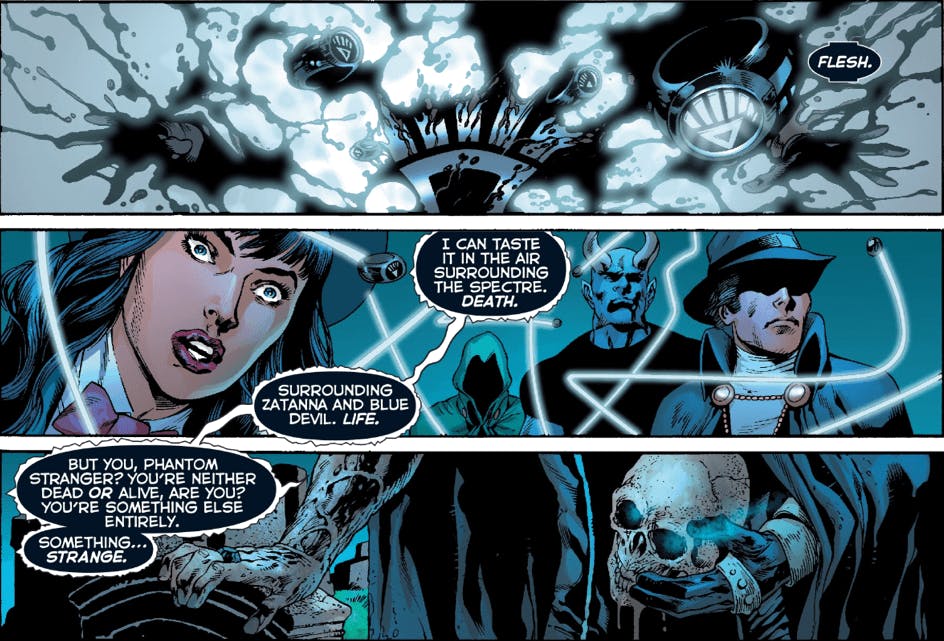
The Phantom Stranger exists in a weird place between life and death, preventing him from being killed. In ‘Phantom Stranger’ #14, the Stranger’s heart was forcibly removed from his body, but he was still able to stalk his criminal prey. Realizing he can’t be killed, the Spectre has sought to torment the Stranger in other ways, such as turning him into a rodent in ‘Day of Vengeance’ #2 (written by Bill Willingham and penciled by Justiniano). In ‘Blackest Night’ #2 (written by Geoff Johns and penciled by Ivan Reis), a Black Lantern attempts to draft the Phantom Stranger into the Black Lantern Corps, but a quick scan of the ghostly hero reveals the startling truth. “You’re neither dead or alive, are you? You’re something else entirely. Something strange,” the Black Lantern stated. Like everything else about him, the Phantom Stranger’s true nature remains a mystery.
He Doesn’t Do Teams
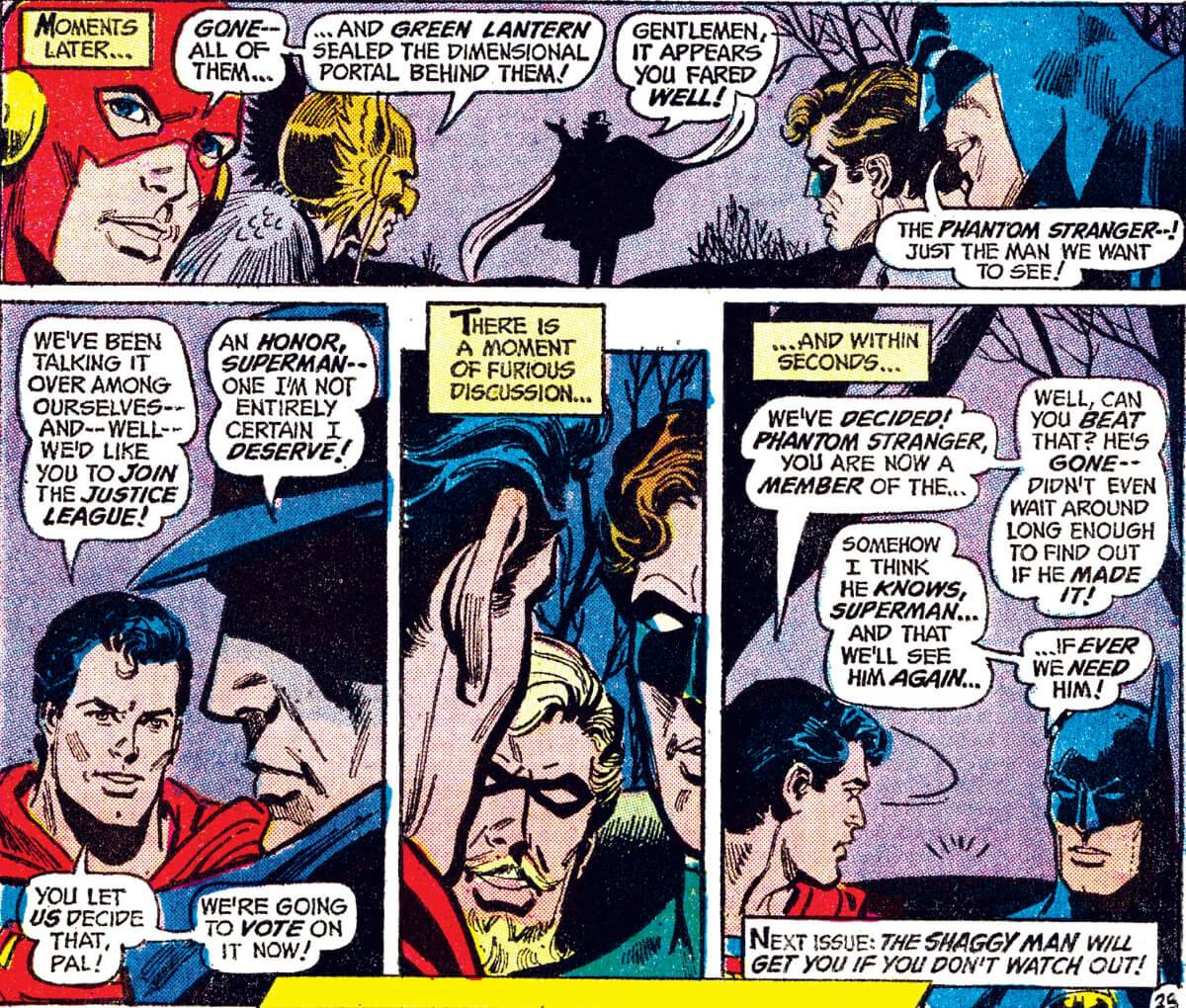
The Phantom Stranger’s unique abilities have benefited Earth's heroes many times, making him a popular choice for Justice League membership. Superman formally invited the Stranger to join the League in ‘Justice League of America’ #103 (written by Len Wein and penciled by Dick Dillin), but he disappeared before responding to the offer. The Phantom Stranger continued to assist the League, but his status as a member was murky. He wouldn’t show up for the regular meetings, and the League didn’t know how to contact him; but if a crisis required his attention, he would join the heroes for battle. The Phantom Stranger had no problem working with them, but it was going to be on his terms, as there were other matters that required his attention. In the end, the League wound up filling his membership slot with other heroes as they were never sure what place the Stranger held in their group. The Creeper also tried to form a group with the Stranger in ‘Blue Devil’ Annual #1 (written by Dan Mishkin and Gary Cohn, penciled by Paris Cullins) and the Stranger enthusiastically refused. While the Phantom Stranger doesn’t do traditional teams, this particular refusal may have had more to do with Creeper’s insufferable nature. After all, even a Phantom Stranger has his limits.
He’s Maintained His Optimism
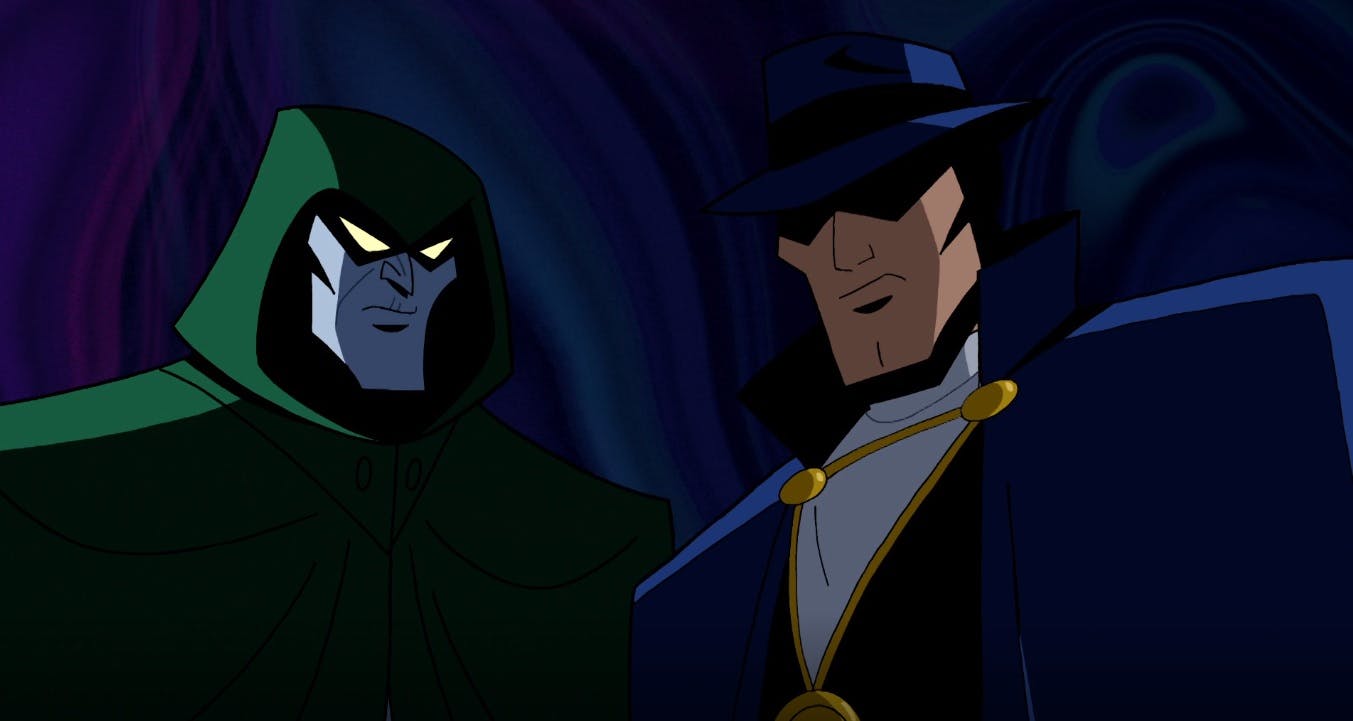
The Phantom Stranger has walked the Earth for centuries and has seen unspeakable evils, but he hasn’t let that change his outlook. Despite the many horrors he’s witnessed, he still believes in the goodness of humanity. This has put him at odds with the Spectre, who believes humanity must be punished for their sins. The two powerful forces have argued on many occasions about justice vs. vengeance, most memorably in the acclaimed ‘Batman: The Brave and the Bold’ episode “Chill of the Night.” In this episode, the Spectre (voiced by Batman: The Animated Series star Mark Hamill) is convinced that Batman will give in to his dark nature when he confronts the killer of his parents, while Phantom Stranger (voiced by BTAS's Kevin Conroy) believes the Caped Crusader’s good nature will triumph. The two powerful entities make a wager, and the Phantom Stranger is proven right when Batman shows restraint against his parent’s killer. It’s admirable that the Phantom Stranger can continue to hold such an optimistic view after all the horrible things he’s seen. And that’s yet another reason we love him!

Comic Book / The Phantom Stranger
"I am known in many realms by many names, Bartholomew Allen, but those that know me in your world call me the Phantom Stranger. I work in-between worlds, an agent of destiny and the Fates, restoring order and balance where chaos has lain her hands."
The Phantom Stranger is the most mysterious of DC Comics' characters: even though he's been around since 1952, his full origin, his identity or even the full extent of his powers has never been revealed. Of course, being mysterious is his main gimmick, so this is intentional.
The character debuted in Phantom Stranger vol. 1 #1 (August-September, 1952), created by John Broome and Carmine Infantino. His original series only lasted 6 issues ending in June-July, 1953. He was revived in Showcase #80 (February, 1969). Then received a second series named after him, which lasted for 41 issues (May-June, 1969 - February-March, 1976). When that series ended, the Stranger started making guest appearances in series devoted to the Justice League of America, Swamp Thing, etc. He has never quite faded away.
The character has changed over the years, though. Originally, he was mostly a host of mysteries involving the supernatural, that he would help debunk... only to leave other people wondering if he was a supernatural being. Ironically, when the Stranger was a guest in some of Doctor Thirteen's (another DC ghost debunker) own stories, he was the subject of the Doctor's attention, but Thirteen could never prove that the Stranger wasn't a magical being.
By the time the Stranger entered the larger DC Universe, it was decided that he was indeed magical, but still little else was revealed about him. He almost always appears to help other heroes deal with a magical menace that they can't handle alone- though his help would always be minimal, only taking a direct hand when absolutely needed. Whether he did this because he saw his job as being helping others to help themselves, or because some Powers That Be limited his actions, or that meddling too much would invariably make things worse, has never been made clear.
The Stranger has starred in his own series, and he did have his own supporting cast, including: Cassandra, a blind psychic who was in love with him; Tannarak, an alchemist obsessed with immortality, an occasional ally; and Tala, a demonic sorceress, best known for being Lex Luthor's moll in the animated Justice League series. Most of these have not been seen in years, though.
The Stranger has an habit of appearing (and disappearing) when nobody is looking, like a leprechaun, which most people find very annoying. He often works with other DC and Vertigo mystics, notably John Constantine, Doctor Occult and Mister E, who are known as the "Trenchcoat Brigade" (though the Stranger wears a cape, not a trenchcoat.)
One of the more unusual moments in the Stranger's publishing history involves Secret Origins, the 1980s anthology series that existed to provide origin stories for those characters who had never been given one before. (Inexplicably, the issue was a crossover tie-in to Legends.) The Phantom Stranger issue contains not one but four origin stories, each by a different writer and each giving different answers to the questions of who the Stranger is, where his powers came from, and why he walks the earth. (Each story also gives a different answer to the question of what color the Stranger's hair was before it was white. It's the little touches...). Here are the options:
- The Stranger is the Wandering Jew. When King Herod ordered all the Jewish male babies killed (in an attempt to eliminate Jesus), Stranger (named Isaac in this version) lost his son (and his wife, who attempted to protect their son) in the ensuing massacre. He spent 30 years furious at Jesus about this, and when Jesus was crucified, the Stranger bribed a guard so that he could be the one to torture the Messiah. Jesus sentenced him to wander until doomsday for this. He eventually realized his mistake and devoted himself to doing good, even turning down an offer to be allowed to die and go to heaven.
- After a biblical event in which God punished a bunch of people, the Stranger was a good man who was spared his wrath. He questions God's actions and commits suicide. The angel who delivered him to safety punished him by barring him from the afterlife, resurrecting his body, and condemning him to walk the Earth, saving people one soul at a time. The angel may or may not have been The Spectre.
- The Stranger is from the far distant future, one of a group of scientists who sought to delay the imminent end of the universe using time travel. The Stranger we know (and the Stranger this scientist will one day become) shows up in this future time to help the scientist stop one of his colleagues, an Omnicidal Maniac who intended to use their project for the destruction of the universe instead of its preservation. Long story short, the not-yet-Stranger scientist time travels back to the very beginning of the universe where the primal forces of creation (in combination with his own inherent potential, and an apparent passing on of life-force from the dying Stranger-We-Know) transformed him into something more than human. When his own time eventually rolls around, he will tip his younger self off about his colleague, unlock his potential, and then, at long last, die. It Makes Sense in Context.note
- The Stranger was an angel who refused to participate in the battle between God and Lucifer. Because of this he was cast out of heaven, but Hell didn't want him either (so he's basically half-fallen). He is thus condemned to walk the Earth for all time. This story was written by Alan Moore, and is generally the most popular interpretation.
It is, of course, entirely possible that none of these are his real origin, but something else entirely is. In fact, considering both the nature of The Stranger and of the DC Universe, it's equally possible that all of them are true, plus however many others you'd care to imagine. (The New 52 has given him a new origin, which is presumably canon for the moment; he was one of three beings punished by the gods of the Rock of Eternity for their sins against magic, and it's heavily implied that he's Judas Iscariot.) With the advent of the DC Rebirth soft reboot, however, he is no longer bound by the events of New 52, and is back to being the same enigmatic fellow he was before.
Contrary to what many fans believe, the origin story that claims the Stranger is a half-fallen angel (that is, he stayed neutral during Lucifer's Rebellion and isn't welcome in either Heaven or Hell as a result) is not the Stranger's official origin, although it is the most popular (being written by Alan Moore probably didn't hurt). Nor are his powers limitless, as he has been seen struggling against magical opponents such as Tala.
He has an unique relationship with The Spectre, the only other DC character who could compared to the Stranger in terms of nature and powers. The two are quite associated to each other through continuities, though they are alternately presented as Headbutting Heroes, Arch Enemies or even Those Two Guys in Batman: The Brave and the Bold. The New 52 upgraded their relationship by tying their origins together and having The Voice make them unlikely (and bitter) allies.
However, he is a member of the Justice League of America, though he still doesn't show up except when they need his help- they can't contact him.
Note also that the Stranger does not wear a mask — that's just an (intentional) visual effect, the shadow of his hat on his face. However, the shadow still appears even when he's wearing a Santa hat, or even no hat at all. He's just that awesome. (His hair, by the way, is white.)
Tropes associated with the character:
- The Ageless: He's been Walking the Earth for centuries showing no signs of wear or tear.
- Adaptational Badass: He seems to be relatively omnipotent, but how much of his power he is allowed or decides to use varies between continuities. This is best exemplified in his occasional personal battles with The Spectre: in the first of them, the Stranger was turned into a rodent by him (as, even with all his power, The Spectre was still unable to destroy him), while in their last struggle in the New 52, he managed to turn The Spectre into a wood statue after defending his attacks for a round.
- All-Powerful Bystander: At times, it seems like the Stranger should be able to easily solve any problem he has, but for some unknown reason is prevented from intervening directly.
- The Atoner: In one of his multiple choice pasts he was the Wandering Jew, who eventually realized that his curse was actually an opportunity to do good and serve God, and even requested to remain alive longer when given the opportunity to be freed from it. This is also part of what he says about his and Pandora's fate: cursed to watch what he has sowed.
- Badass Longcoat:
- Though he traditionally wears a cape, he dons a trench coat in The Books of Magic and The Trenchcoat Brigade
- It should be noted that in his original (1950s) appearances, he does wear some kind of overcoat, with a button-up shirt and tie. (This look can be seen in the upper-left-hand corner spot illustration on the cover reproduced above.)
- Broken Angel: In the Fallen Angel origin, the angel that would become the Stranger had his wings violently ripped off by some angry demons after he tried to find refuge among them.
- The Call Knows Where You Live: It's not uncommon for his guest appearance to be almost entirely a way of getting whatever hero he's visiting into the adventure in the first place, after which he will disappear to engage in an ill-defined mystical battle with whatever the foe is, and reappear to return the hero home afterwards.
- The Chessmaster
- Cool, but Inefficient:
- The Stranger is a very powerful being, possibly one of the strongest forces in the DC Universe, but he does not use his power most of the time, and when he does directly go to war it's often against forces that are either a match or stronger than him, like the Spectre.
- In addition, he's not very reliable in general. One time Cassandra Craft asked him to pick up some bread. It took him two years, and when he finally showed up he couldn't remember if she wanted wheat or sourdough.
- Chronic Backstabbing Disorder: The New 52 version is cursed to betray anyone he attempts to help.
- Cosmopolitan Council:
- The Stranger was one of the members of "The Quintessence", an alliance of powerful good mystics who watched over the DC Universe... and rarely did anything else. As of current continuity, it's no longer in operation.
- In the New 52 continuity, an alliance of mystics branded the Stranger as one of the three greatest sinners of all time and cursed him to forever be a stranger to humanity.
- Depower: During the events of Infinite Crisis, the Spectre, for all his power, couldn't flat out destroy the Stranger. However, he was still able to reduce him to the shape of a mouse and seal his sorcery.
- Deus ex Machina: The role he plays most often is that of solving a hero's insurmountable problem and sets him on the path to save the day. In Justice, he travels to the inner world created by Hal Jordan to furnish him with his lantern and a way home after he was nearly kicked out of the universe, and in JLA/Avengers, he slips into the Marvel universe to provide the heroes with a way to reach the dying Grandmaster.
- Disabled Love Interest: Cassandra Craft, the Stranger's blind girlfriend.
- Distaff Counterpart: Madame Xanadu.
- Dungeon Master: A good one, but his motives are a mystery.
- Evil Sorcerer: Tala and Tannarak.
- Face Framed in Shadow: He doesn't wear a mask, but no matter what type of hat he's wearing it always casts a shadow over the top half of his face to achieve the same effect. Even when he's not wearing a hat at all.
- Flat-Earth Atheist: Dr. Thirteen.
- Flying Dutchman: One of the suggested origins for the Stranger is that he's the literal Wandering Jew. Not very likely to be used often though, as this origin involves Jesus.
- Guile Hero: Bordering on Magnificent Bastard. Although he is extremely powerful, the Stranger is forbidden from directly interfering and must persuade others to do so.
- Headbutting Heroes:
- With the Spectre in the New 52. On a mission from God, the Stranger led Jim Corrigan to get killed, turning him into the Spectre. Spectre hates Stranger for it. Stranger refuses to accept responsibility. They are often forced to work together, and are very unhappy about it.
- Madame Xanadu also loathes him, as his interference prevented her from aiding King Arthur in his final battle and might have doomed Camelot. Strangely, while the Stranger says it was time Camelot fell, he also denies any involvement and does not remember Xanadu.
- Ironically for both, in Madame Xanadu's series he tried to stop Jim Corrigan's death, but his long story of screwing over Madame X resulted in her biting back by allowing Corrigan to die, resulting in the Spectre's return.
- Hell of a Heaven: The New 52 version calls Heaven "my personal hell". This makes a lot of sense, considering his origins at that point.
- I Have Many Names: By virtue of his open ended background, he'll normally introduce himself as exactly none of them.
- Inexplicably Awesome: Its part of his entire shtick. While it got lessened a lot in the New 52, it was reset with DC Rebirth.
- Intangible Time Travel: One of the Stranger's powers.
- Joker Immunity: Tannarak. The guy just refuses to stop coming back.
- Jury of the Damned: The Stranger once had to defend Superman before one.
- Mad Libs Catchphrase: Its fairly common for him to introduce himself with an little poetic speech ending in an offer of help from "a Stranger" rather then ever just call himself the Phantom Stranger.
- Multiple-Choice Past: Several intentionally conflicting origins have been suggested for the Stranger.
- Still in force as of his Blackest Night tie-in. Not only is he neither alive nor dead, but he is something "strange" (this is coming from black rings that in all other cases, with the exception of identifying the White Light, are perfectly accurate at assessing emotional states, life and death, and so on - yet they do not recognize what he is) that even Nekron does not understand. And when a Black Lantern attempts to take his heart, a page is shown of three of the possible origins of the Stranger, followed by the Black Lantern lying on the ground covered in scorch marks (thrown out violently with no harm being done to Stranger) and the Phantom Stranger declaring that the Black Lantern has "seen everything and nothing" of the truth.
- In The Books of Magic, the members of the Trenchcoat Brigade are forced to relive each other's origins. John Constantine gets to see the Stranger's, which he experiences as being cast out of Heaven and reprimanded by God, similar to the fourth potential origin mentioned above.
- The New 52 provides another possible explanation for what he is: along with Pandora, the instigator of Flashpoint and the New 52, he is one of three sinners that is cursed to watch what they have sowed. The question is this: what did the Phantom Stranger do? He is later revealed to be Judas Iscariot, the man who sold out Jesus for 30 pieces of silver. He wears the 30 silver pieces on a necklace that was seared into his neck (turning his hair white in the process) as part of his punishment.
- My Significance Sense Is Tingling: Pretty much always knows something odd is going on, possibly just by virtue of his being there.
- Mysterious Past: Half the point of the character is that nobody knows who he is.
- Necromantic: Professor Nathan Seine was a scientist who studied magic in an attempt to cure his wife's fatal illness. When his wife is killed by his own magic during a battle with the Stranger, Seine becomes obsessed with getting revenge on the stranger, and find a way to return his wife to life.
- Neutrality Backlash: One of the Stranger's possible origins: he was an angel who refused to take sides in the war between Heaven and Hell. Afterward both sides cursed him, and condemned him to be a stranger forever walking the Earth.
- Nice Hat: He just wouldn't be the same without his fedora.
- No Name Given: Though in one of his four aforementioned multiple choice pasts his original name was Isaac; none of the other three, by the way, offer any name. Averted in his New 52 background, where it's revealed he was Judas.
- Occult Detective: Since he can't generally can't just power through situations but wants to help he acts like this.
- Older Than They Look: Much, much older.
- The Omniscient Council of Vagueness: To give an idea of just how powerful he is, he's part of The Quintessence. His equals include Zeus, Highfather, the Wizard Shazam, The Spectre and Ganthet.
- Our Angels Are Different: In the Stranger's angelic origin it is speculated that he was an angel who might have had a significant impact in the celestial struggle but instead took neither side in the Heavenly Civil War.
- Physical God: It's highly unlikely that he actually is one, but he's powerful enough that mistaking him for one is entirely reasonable. When you can fight a very pissed Spectre at full power and make him look like a chump, there aren't really any other sufficient labels.
- Race Lift: Garth Ennis's questionably-canonical All Star Section Eight mini-series features a rapping African-American Soul Brotha version of the Stranger.
- Really 700 Years Old: Can range from well within history to as old as time itself, depending on what background if any is being used.
- Refusing Paradise: At the end of the origin story that states he's the original Wandering Jew, God tells him he's earned time off for good behavior and can go to heaven now, and he asks to stick around on Earth and keep helping people.
- Shrouded in Myth: Anybody who's anybody on the magic side of the DCU has heard of him, and just as many people know little beyond that.
- The Slow Path: In another of the origins, the Stranger is a man from the distant future traveling home the only way he can.
- Stable Time Loop: In the man-from-the-future origin.
- Stealth Hi/Bye: A venerable master of it. He can even pull off this trick right in front of someone's eyes.
- To Hell and Back: The Stranger CAN enter Hell- he just isn't welcome there.
- Trenchcoat Brigade: See Badass Longcoat above. A member of the Trope Maker.
- Walking the Earth: All of his origins have him doing this for one reason or another, either out of choice or because he must wait until the end of time to die.
- The Watcher:
- Sometimes the Stranger merely narrates a story rather than taking an active part in it.
- The DCU's nearest analogue to Uatu as both have a way of meddling while claiming to not be able to intervene. Making the Stranger more proactive than Destiny of the Endless and more established than direct Expy the Monitor.
- In a Madame Xanadu series, he insists it is not his place to interfere, except at certain junctures, to specific ends. Madame X concludes that this is an excuse to do whatever he likes and then disappear without dealing with the consequences.
+++++++++++++++++++++++++++++++++++++++++++++++++++++++++++++++++++++++
+++++++++++++++++++++++++++++++++++++++++++++++++++++++++++++++++++++++
+++++++++++++++++++++++++++++++++++++++++++++++++++++++++++++++++++++++
- Bloggery committed by chris tower - 2004.19 - 10:10
- Days ago = 1751 days ago
- New note - On 1807.06, I ceased daily transmission of my Hey Mom feature after three years of daily conversations. I plan to continue Hey Mom posts at least twice per week but will continue to post the days since ("Days Ago") count on my blog each day. The blog entry numbering in the title has changed to reflect total Sense of Doubt posts since I began the blog on 0705.04, which include Hey Mom posts, Daily Bowie posts, and Sense of Doubt posts. Hey Mom posts will still be numbered sequentially. New Hey Mom posts will use the same format as all the other Hey Mom posts; all other posts will feature this format seen here.






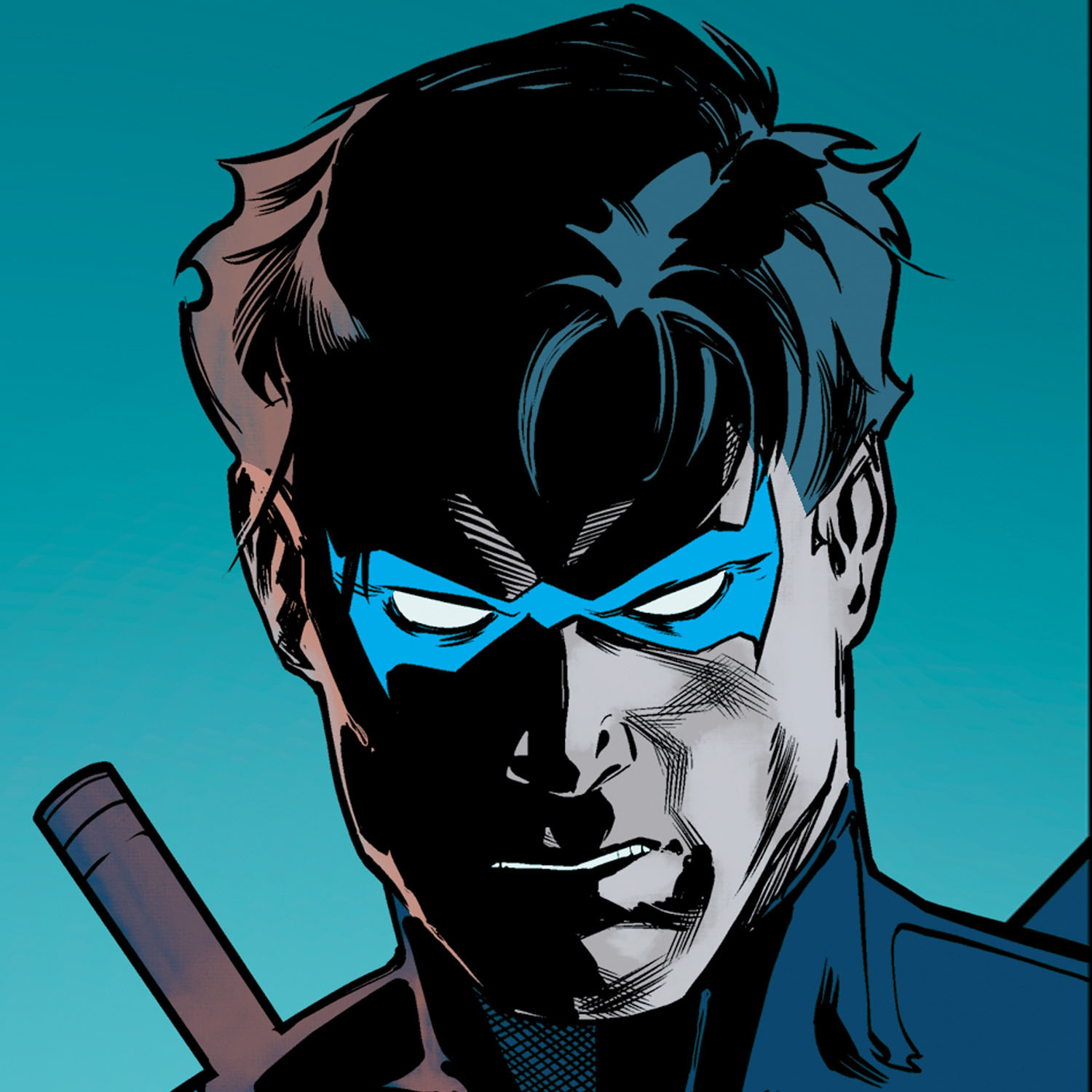

No comments:
Post a Comment